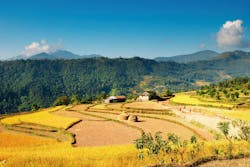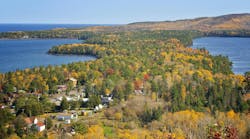Clean Water Organization Brings New System to Nepal Village
Some of the most extreme landscapes in the world are etched into the country of Nepal. Massive mountain ranges soar up to the sky with vast valleys plummeting for miles below. The treacherous terrain is challenging enough, and yet the Nepali people also weather monsoon rains, earthquakes, political upheaval, and civil war.
All of this has led to resilience.
This resilience is found in Amrauli Village. Tucked away in the lowlands of the Chitwan District of the Bagmati Province, 173 households with a total population of 865 reside in this small cluster of one or two-story adobe and timber homes.
About half the population of Amrauli are women. Many navigated the threatening landscape for nearly two hours each day just to fetch drinking water. This trek required completion before they could begin tackling their daily household chores. Not to mention, many in the area used traditional forms of water access like old wells and natural water sources, which can be contaminated with coliform, metals, fecal matter, and more.
That was then.
Today, life is much different for these people who now have a solar pump and easy access to clean water. This village is now one of the few across Nepal with access to safely managed water. And it’s just the beginning of a safer life in Amrauli.
The project was completed in August 2022. At that point, 19 people in the village were trained on maintaining the quality of the water system, including simple maintenance tasks, and proper use of the water system for long-term use. These community members disseminate the information to others in the community when necessary.
For Geeta Mahato and the other women of Amrauli, clean water has freed them up from having to walk miles across the treacherous terrain. Now, Mahato and her neighbors can focus primarily on establishing their livelihood. Mahato herself has started to gather and sell fish at the local market with the help of a new project in Amrauli, the Micro-Income Generating Revolving Fund. The idea for this fund is that once there is access to safe water, individuals have more time for economic gain, education, and other forms of empowerment.
With skill and determination, many of the women are actively involved in fisheries, poultry, and pork production. The Amrauli Village residents have even created a revolving fund, which has helped them collectively generate nearly $1,500 for this emerging community.
This revolving fund was established to offer loans at affordable rates to members who paid into this account. Additionally, the funds are spent or invested with the condition that repayments or income from the fund may be used again for these same purposes.
After almost one year, employment opportunities for the village have impacted nearly all of the households, enhancing the living standard for nearly everyone, especially among women. Children are healthier and thriving—they attend school with fewer absences due to water-borne illness. Even the animals they raise are benefiting from the new water source.
From inception, the revolving fund was started so 40 families could take ownership in income-generating activities like poultry farming, fish farming, pig farming, and kitchen gardening. Thanks to clean, safe, managed water, this project is just starting to take shape.
As time and resources open up, Amrauli Village can now experience a new life together, one that is more dignified and secure. And yet, this community's beautiful resilience is responsible for them establishing a livelihood that is seeing them flourish.
Wine to Water, a global clean water organization committed to preserving life and dignity through the power of clean water, came to the village with a goal to bolster the community and enable individuals to thrive. According to Wine to Water spokespeople, Amruali was chosen by the Rotary Club Londonderry because it is one of the most remote and financially disadvantaged areas in the world. In addition, there is a local chapter of Rotary International in the area, Rotary Club Narayangarh, which serves the same purposes and has the locational connection to Amrauli. Wine To Water, having a permanent office in Nepal, partnered with the Rotary Club’s when they heard of the work that was needed in Amrauli.
Now, Wine To Water Nepal, the Rotary Club Londonderry, and the Rotary Club Narayangarh actively monitor progress. Members of the Wine To Water staff often stay in contact with community members in the area, including people like Hema Chaudhari. A Social Mobilizer for Wine To Water, Chaudhari worked with the community before the water project was installed. Her job was to find people willing to join the cause and advocate for the new system. By communicating with the local leaders, Wine To Water Nepal and the Rotary Club chapters continue monitoring progress of the programs and their impact.
In many of Wine To Water relief projects, the communities are ravaged by flood and the water supply is compromised. Most experts view these floods and severe weather events as byproducts of global climate change. The United States Environmental Protection Agency summarizes this phenomenon on their website, as warmer temperatures cause more water to evaporate from the land and oceans, changes In the size and frequency of weather events occur.
By providing clean, safe, managed water, and educating communities on hygiene and sanitation, resilience is developed and communities flourish.
Author bio:
Josh Anderson is a writer for for LiveWireCopy.com. Anderson can be reached at [email protected].
About the Author
Josh Anderson
Josh Anderson is a writer for for LiveWireCopy.com. Anderson can be reached at [email protected].


